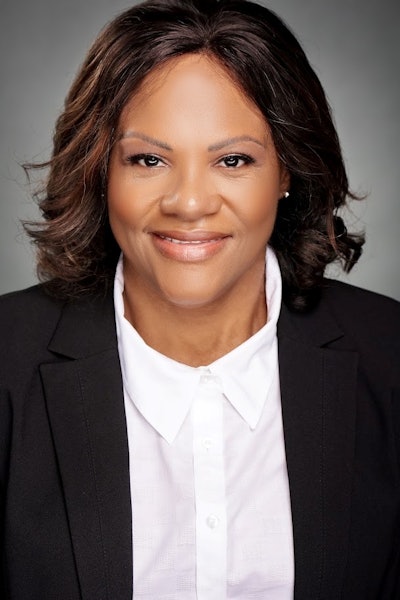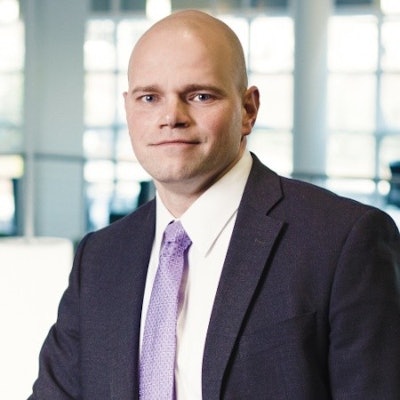COVID-19 pushed higher education online almost overnight. The field transformed itself, troubleshooting on the go to make sure students could succeed while quarantining at home. Federal funding was heavily invested in resources that connected students with technology and high-speed internet.
As the pandemic has begun to taper, many institutions are transitioning back to fully-in-person education—but not all.
 Dr. Jessica Davis-Ganao, associate professor and chair of the criminal justice program at North Carolina Central University.
Dr. Jessica Davis-Ganao, associate professor and chair of the criminal justice program at North Carolina Central University.
These programs offer their students options to attend class in person, online, or asynchronously. TCSG and NCCU representatives say this flexibility has made their students happier and increased equitable access to higher education, critical in a time of decreasing college enrollment numbers.
To better understand shrinking enrollment, Dr. Jessica Davis-Ganao had conversations with students about what might be preventing them from enrolling or persisting. Davis-Ganao is an associate professor and chair of the criminal justice program at NCCU, a Historically Black College and University (HBCU) in Durham, NC.
Students told her that their needs outside of the classroom, like work or caretaking for dependents, made it very difficult to attend class, particularly for students in the criminal justice program. Many early criminal justice careers work difficult hours that conflict with evening courses, said Davis-Ganao.
Davis-Ganao said she had been wanting to incorporate online instruction for almost a decade, but it wasn’t until COVID that she finally had the opportunity to push her department into the option. Now, they are pilot testing hyflex learning at the graduate level. In monthly gatherings, students relay just how much they appreciate the flexibility now available to them, and so far attendance has stayed at the same levels as in-person instruction.
“Students are absolutely loving it,” said Davis-Ganao.
The most difficult part of the hyflex transition has been acclimating faculty to new technology.
“Everyone we talk to about hyflex, they’re like deer in the headlights,” said Davis-Ganao with a laugh. “Once I explain it to them, they’re like, ‘oh, it’s what we did during COVID.’ But now, we have better technology.”
NCCU partnered with Webex by Cisco, an online conferencing software that offers high-tech ways to implement instruction, like digital whiteboards. It can also be integrated into an institution’s learning management system. Cisco offered multiple trainings to faculty, and Davis-Ganao has helped to troubleshoot lesson-planning to ensure both students and faculty have what they need to be successful.
Gary DePreta, an area vice president with Cisco’s U.S. public sector organization, said that although the pandemic was the trigger to move programming online, meeting students’ needs for greater flexibility was a long time coming.
“Our student populations were already beginning to have expectations of learning differently, having access to different resources as consumers. Nowadays, they can get everything remotely when they want from their iPhone,” said DePreta.
 Steven Ferguson, chief information officer at the Technical College System of Georgia.
Steven Ferguson, chief information officer at the Technical College System of Georgia.
Before March 2020, Steven Ferguson, chief information officer at TCSG, was already working to incorporate newer, better technologies into instruction. When the pandemic hit, because many faculty were already comfortable incorporating online instruction, they were able to fine-tune and explore how to offer technical training remotely, even setting up remote evaluations for assessments like how to change a car’s brakes.
Ferguson started TCSG’s eCampus program during the height of the pandemic, focusing COVID resources like funding from the Coronavirus Aid, Relief, and Economic Security (CARES) Act on improving wireless in rural regions with sparse or slow signal, expanding access and opportunity to those not living in metropolitan areas.
“Two years later, in fall 2022, we have all 22 colleges participating [in eCampus], over 300 courses offered, and 2,400 seats taken,” said Ferguson, adding that consistent demand for online programming means that enrollment doesn’t vary by region. “Now, the school can leverage single faculty across multiple locations. It changes the economic incentive and allows [the schools] to provide more content into the communities they serve.”
This transition to hybrid learning is increasing the workforce across the whole state of Georgia, said Ferguson, meeting the needs of both students and employers.
“Not everyone has semesters and years to engage in education. They need something now,” said Ferguson. “We have to be more flexible. We’re serving tech natives, Gen Z—even Gen X and Millennials—they expect this hybrid environment. And if you don’t have it, they’ll find somewhere that does.”
Liann Herder can be reached at lherder@diverseeducation.com.



















